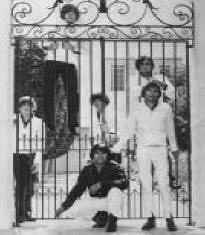
The Outsiders were an American rock and roll band from Cleveland, Ohio, that was founded and led by guitarist Tom King. The band released the hit single "Time Won't Let Me" in early 1966, which peaked at No. 5 in the US in April. The band had three other Hot 100 top 40 hit singles in 1966, but none on the Hot 100 afterwards, and released a total of four albums in the mid-1960s.
The Choir was a garage rock band largely active in the greater Cleveland area from the mid-1960s into the early 1970s. Originally called The Mods, their largest commercial success came with the release of their first single "It's Cold Outside" in December 1966. The song, considered to be a classic of the garage rock era, was featured on Pebbles, Volume 2, one of the earlier garage rock compilation LPs. The flipside, "I'm Going Home" was included as a bonus track when the Pebbles album was reissued as a CD, and it can also be found on a garage rock compilation LP on Ohio bands, Highs in the Mid-Sixties, Volume 9. The Choir is well known for containing three of the four original members of Raspberries.
Milan Radenkovich (December 15, 1941 – March 14, 1971), who was always credited mononymously as Milan, was an American record producer, songwriter and recording artist on numerous songs made throughout the 1960s, mostly though not exclusively in the garage rock genre. He released an LP and numerous singles for seven different national record labels and other independent labels (a total of more than 30 songs) under a variety of names, including Milan with His Orchestra, Milan, The World of Milan, Milan (The Leather Boy), and The Leather Boy, and also worked under the name Rick Rodell. As a producer, arranger and/or songwriter, Milan oversaw many other releases by a variety of artists ranging from the pop singer Lou Christie to the psychedelic rock band the Head Shop.

Pebbles is an extensive series of compilation albums in both LP and CD formats that have been issued on several record labels, though mostly by AIP. Together with the companion Highs in the Mid-Sixties series, the Pebbles series made available over 800 obscure, mostly American "Original Punk Rock" songs recorded in the mid-1960s — primarily known today as the garage rock and psychedelic rock genres — that were previously known only to a handful of collectors. In 2007, the release of the Pebbles, Volume 11: Northern California CD marked the final album in the Pebbles series. The following year, Bomp! marked the 30th anniversary of the original Pebbles album with a spartan, limited-edition, clear-vinyl reissue complete with the original pink cover insert.

Pebbles is a compilation of US underground and garage single record releases from the mid- to late-1960s. It had a limited original release in 1978 and a more general release in 1979. It was followed by several subsequent Pebbles compilations and albums. This album is nowadays known as Pebbles, Volume 1 and was originally issued in 1978 as Pebbles, Volume One: Artyfacts from the First Punk Era, an obvious riff on Nuggets: Original Artyfacts from the First Psychedelic Era, a similar, groundbreaking compilation from 1972.

Pebbles, Volume 4 is a compilation album in the Pebbles series that has been issued in both LP and CD formats. Unlike other volumes in the series – which compile obscure garage rock and psychedelic rock music – Volume 4 collects rare examples of surf rock. The LP is subtitled Summer Means Fun, while the CD is subtitled Surf N Tunes. Another Pebbles, Volume 4 was issued on CD a few years earlier by ESD Records and has completely different tracks.
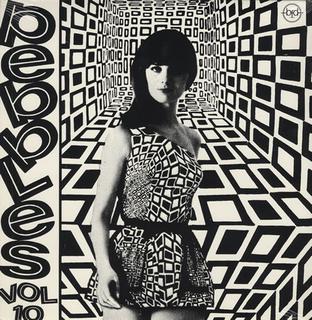
Pebbles, Volume 10 is a compilation album among the LPs in the Pebbles series. The music on this album has no relation to Pebbles, Volume 10 that was released on CD many years later.
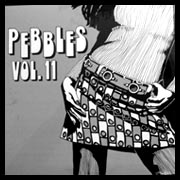
Pebbles, Volume 11 is a compilation album among the LP's in the Pebbles series and has no relation to the Pebbles, Volume 11 CD that was released many years later. The cover was adapted and colorized for a later Pebbles double CD, Essential Pebbles, Volume 2.
Mouse and the Traps was the name of an American garage rock band from Tyler, Texas, United States, that released numerous singles between 1965 and 1969, two of which, "A Public Execution" and "Sometimes You Just Can't Win", became large regional hits. The leader of the band, nicknamed "Mouse", was Ronny Weiss. Two of their best known songs, "A Public Execution" and a cover of "Psychotic Reaction", are not actually credited to this band but, respectively, to simply Mouse and Positively 13 O'Clock instead. Their history also included one single that was released under the pseudonym Chris St. John. The band are not to be confused with the girl group Mousie and The Traps who recorded for Toddlin' Town records around the same time.

The Pebbles Box is a 5-LP box set of mid-1960s garage rock and psychedelic rock recordings, primarily by American bands. Several years later, a similar 5-CD box set was released that was called the Trash Box. The Pebbles Box purports to collect the first five volumes of the Pebbles series, although there are fewer songs than on the original LPs: 72 total tracks on the five discs, as compared with 86 on the original LPs. Also, as is generally true of the CD reissues of these five volumes, the tracks differ significantly on all five discs as compared to both the original Pebbles LPs and the later Pebbles CDs in the corresponding volumes; and the surf rock rarities on Pebbles, Volume 4 have been eschewed entirely.

Trash Box is a 5-CD box set of mid-1960s garage rock and psychedelic rock recordings, primarily by American bands. This box set is similar to the earlier Pebbles Box and includes almost all of the same recordings in that box set, along with numerous bonus tracks at the end of each disc. Supposedly, the Trash Box collects the first five volumes of the CDs in the Pebbles series. However, as is generally true of the CD reissues of these five volumes, the tracks differ significantly on all five discs as compared to both the original Pebbles LPs and the later Pebbles CDs in the corresponding volumes; and the surf rock rarities on Pebbles, Volume 4 have been eschewed entirely. Overall, there are 109 tracks in the box set as compared to 101 songs on the individual CDs and 72 tracks in the Pebbles Box.

Pebbles, Volume 6: Chicago Pt. 1, also known as Chicago 1, is a compilation album featuring American garage and psychedelic rock musical artists from the 1960s that were associated with the Chicago music scene. It is a compact disc installment of the Pebbles series, and was released on AIP Records in 1994.

Essential Pebbles, Volume 2 is a compilation album in the Essential Pebbles series. Although subtitled Still More Ultimate '66 garage classics!, not all of the recordings on the album were originally released in 1966.
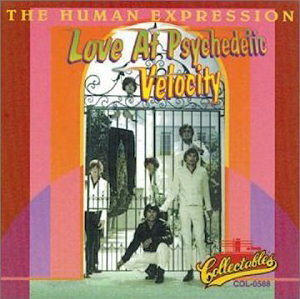
Love at Psychedelic Velocity is a retrospective album by the American garage rock band the Human Expression that was released on the compact disc format.
The Starfires was an American garage rock band from Los Angeles that is best known for one of the most sought-after singles of the mid-1960s, "I Never Loved Her", which can command prices of $1000 or more.
Highs in the Mid-Sixties were a series of compilation albums released in the mid 1980s on AIP Records developed by Greg Shaw. The series was spun off of the similar Pebbles series. Each volume focuses on a specific geographical region.

English Freakbeat, Volume 1 is a compilation album in the English Freakbeat series, featuring recordings that were released decades earlier, in the mid-1960s.

Green Crystal Ties, Volume 9: The Great Lost Psychedelic Garage Bands is a compilation album featuring obscure American psychedelic rock musical artists that recorded in the 1960s. It is the ninth installment of the Green Crystal Ties series and was released on Collectables Records on April 7, 1998. The album is considered one of the series best showings of psychedelic music.

Green Crystal Ties, Volume 6: Rarities from the Psychedelic Vaults is a compilation album featuring obscure psychedelic rock bands that recorded in the 1960s. It is the sixth installment of the Green Crystal Ties series and was released on Collectables Records on April 7, 1998. Though Volume 6 focuses specifically on psychedelia, the album is commended for featuring a wide-diversity of musical styles intertwined in the genre.
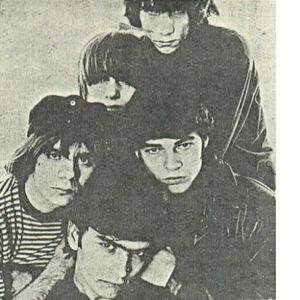
The Groupies were an American garage rock-psychedelic rock band from New York City who were active in the 1960s and are known for an innovative approach to primal blues-based rock exemplified in such songs as "Primitive". They were a popular fixture in the New York club scene and recorded for Atco Records, later venturing to Los Angeles. Due to their uncompromising stance the Groupies failed to attract a wider audience outside of their local enclaves. They have come to the attention of garage rock and psychedelic enthusiasts and their work has been included on various compilations such as the 1998 Nuggets four-CD box set, which was released on Rhino Records. Their material has been re-issued on other garage rock and psychedelic compilations such as the Pebbles, Volume 10 LP.
